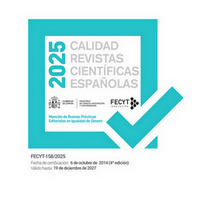The power from bellow: joint committees and sindical unions during the Spanish Civil War (1936-1939).
Keywords:
Spanish Civil War, anarchism, socialism, syndical unionsAbstract
This paper is aimed at studying the different joint committees between the UGT (General Union of Workers) and the CNT (National Confederation of Labour) organized during the Spanish Civil War in Republican territory, especially after 1939, the less-studied period so far. By the beginning of 1938, UGT and CNT encouraged syndical unions through the establishment of intelligence bases which, one month later (on the 18th of March), configured the formation of the UGT-CNT National Joint Committee. This implied a reinforcement of popular power in a moment of maximum difficulty for the government of the Socialist leader Juan Negrín. The President expected to lift the morale of the population both in the front and in the rearguard with an action from below in order to be able to continue his policy of staunch resistance against the Republican parties and wide sectors of his own party and labour union who considered that, given the negative evolution of the war, it was time to propose surrender. The committee tried to spread throughout all the territories and productive sectors, but in many cases these committees finished in the hands of Izquierda Socialista (Socialist Left) or caballeristas the most important critical sector within the PSOE, led by the labour unionist of the UGT and ex-President Francisco Largo Caballero. This forced Negrín to distance from this ‘power from bellow’. The communists, his main allies, had no interest in creating a working-class power where the PCE was not represented at all. The FAI did not make things easier to their anarchist colleagues in the CNT.
Downloads
Downloads
Published
Issue
Section
License
All the articles published in Investigaciones Históricas, época moderna y contemporánea will have a Creative Commons Attribution 4.0 International License (CC BY 4.0).
The journal allows the authors to retain publishing rights. Authors may reprint their articles in other media without having to request authorization, provided they indicate that the article was originally published in the journal Investigaciones Históricas, época moderna y contemporánea.



